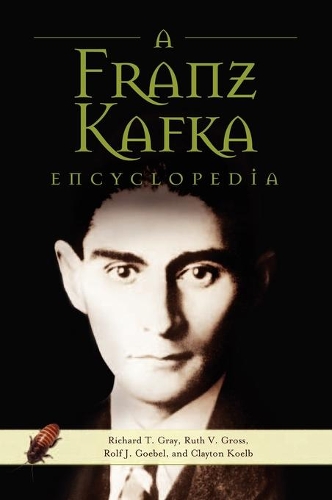
A Franz Kafka Encyclopedia
(Hardback)
Publishing Details
A Franz Kafka Encyclopedia
By (Author) Dr. Richard T. Gray
By (author) Ruth V. Gross
By (author) Rolf J. Goebel
By (author) Professor Clayton Koelb
Bloomsbury Publishing PLC
Greenwood Press
30th August 2005
United States
Classifications
Professional and Scholarly
Non Fiction
Literary studies: c 1900 to c 2000
833.912
Physical Properties
Hardback
392
Width 178mm, Height 254mm
964g
Description
More than 800 entries detail the life and works of one of the most enduring authors of world literature. Few writers have had as great an impact as Franz Kafka. Known for depicting alienation, frustration, and the victimisation of the individual by impenetrable bureaucracies, his works have given rise to the term "Kafkaesque," which people use to describe similar situations in their own lives. Although his influence has been enormous and he has secured a lasting place in contemporary culture, his writings often are seen as inscrutable, especially for readers approaching them for the first time. Designed for undergraduates, specialists, and general readers, this encyclopedia details his life and works. Included are more than 800 alphabetically arranged entries on his works, characters, themes, family members, acquaintances, and other topics, including: Abraham; Absurd; Animals; Bureaucracy; Colonialism; Death; Don Quixote; Sigmund Freud; Guilt; Irony; Judaism; K.; Thomas Mann; Nihilism; and many more. Entries often cite works for further reading, and the encyclopedia closes with a selected, general bibliography. Written by a team of leading scholars; Summarizes all of Kafka's works and discusses his major characters; Explains his relationships with family members and acquaintances; Explores his themes, influences, and literary and intellectual culture
Reviews
Gray and his coauthors offer a wonderfully rich compendium of facts, opinions, explications, and exegeses that cover every conceivable aspect of Kafka's life and writings. Individual articles of varying lengths, by four of the world's leading Kafka scholars, explore in great detail the personages, plots, techniques, and impacts of Kafka's works, and also shed extensive light on his personality, mindset, and approach to the craft of writing. Many of the more substantial articles also provide brief Further Reading lists, most frequently in German or English; these add considerably to the book's research and teaching value. Alphabetical and classed lists of entries (with corresponding English key for terms in German) are also very useful features of this intelligently planned, beautifully executed reference work. An extensive and very up-to-date bibliography of secondary works rounds out this encyclopedia, which is sturdily made and printed on NISO permanent paper standard stock. This indispensable volume will be useful for any library supporting programs in modern European literature, and also appropriate for most large public libraries that have collections of contemporary belles lettres. Highly recommended. Lower-level undergraduates through faculty/researchers. * Choice *
In the absence of adequate reference tools about Kafka, this impressive but easy-to-navigate volume will be useful for students, specialists, and general readers. Highly recommended for all large collections, Kafka lovers, and specialists on the run; essential for serious literature collections. * Library Journal *
[T]he authors of this work have provided an invaluable reference tool for those researching Kafka at all academic levels, and for those who enjoy reading Kafka There is a purpose and completeness in this impressive reference work that will make it an essential item on academic and public library shelves The four authors of this Encyclopedia have succeeded in providing a way of better understanding Kafa, his writings and his milieu, of sharing the writer's experience and of illuminating the inexplicable. * Reference Reviews *
The Kafka Encyclopedia is an extremely useful publication which should find a place in all libraries with a section for literature As a reference work it is ideal for dipping into or checking facts, plots, or other details. If it takes the place it deserves among works consulted by students, it will help to dispel some of the myths and canards which still crop up in their essays. * Modern Language Review *
No literature collection should do without this invaluable reference source for students and scholars of Kafka. * German Studies Review *
A Franz Kafka Encyclopedia is a 'must' reference for any college-level collection including Kafka studies: over 800 alphabetically arranged entries cover his works, characters, themes, and times.[i]nvaluable to in-depth papers. * Midwest Book Review *
Franz Kafka has had an enormous impact on modernist literature, and the legacy of his Kafkaresque writings prefigures the postmodern inability to penetrate meaning and absence of stable definitions. Here, more than 800 entries offer insights into the works, characters, themes, family, friends, and acquaintances of the writer. The aim is to provide background information about Kafka's life and context, his styly of writing, and the range of his involvement with the intellectual and cultural climate of his age.A Franz Kafka Encyclopedia is a well-put-together reference work that should be useful for scholars and students. Recommended for academic and large public libraries. * Booklist/Reference Books Bulletin *
Because what else would you rather do on a sweltering summer day at the beach than get in touch with your inner feelings of paralytic claustrophobia. * The L Magazine *
Author Bio
RICHARD T. GRAY is Byron W. and Alice L. Lockwood Professor in the Humanities at the University of Washington, where he teaches in the Department of Germanics. RUTH V. GROSS is Head of the Department of Foreign Languages and Literatures and Professor of German at North Carolina State University. ROLF J. GOEBEL is Professor of German at the University of Alabama, Huntsville. CLAYTON KOELB is Guy B. Johnson Professor of German and Comparative Literature and Chair of the Department of Germanic Languages at the University of North Carolina, Chapel Hill.
